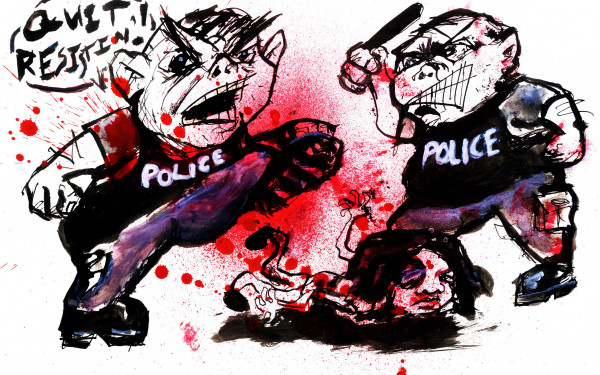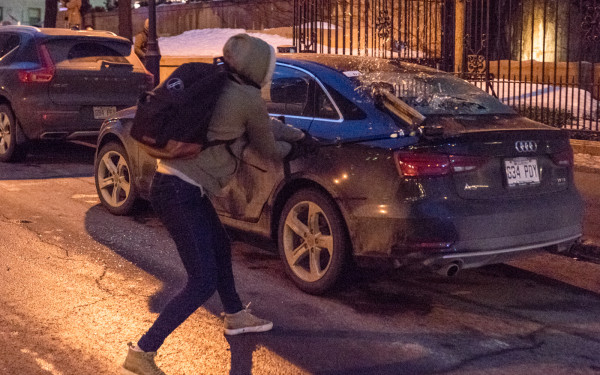Maybe It’s Time to Hold Montreal Police Accountable
A Reaction to the Montreal Gazette’s “Millenial Columnist”
Only four days after the annual anti-police brutality march—where the police injured a woman so badly that she was sent to the hospital—the Montreal Gazette published a column titled “Maybe It’s Time to Cut Montreal Police Some Slack.”
This article has been updated.
Content warning: description of police brutality and racial profiling.
In the article, Marc Richardson writes that he finally understood that he was part of the problem that the Montreal police are trying to fix after getting a ticket for jaywalking.
He describes the Sainte-Marie-Saint-Jacques neighbourhoods as “eclectic, to say the least,” and being home to “rampant drug use and prostitution, a large homeless population, and a number of shelters, but also increasingly young, mobile residents living in new or refinished buildings.”
“But where do you start when you’re trying to get all of the above to live harmoniously together? By making sure that people cross the street when they’re supposed to, that they obey speed limits, and that they put their garbage out at the right time,” he writes. “Because when those things are taken care of, the SPVM can dedicate more officers to complex issues like homelessness and drug trafficking.”
Not only does this demonize drug users, sex workers, and the homeless—a thought process that creates more problems than it solves—it also excuses the behaviour that causes the animosity that people feel towards the police in the first place.
When I hear the people around me say “fuck the police,” it’s never out of a complaint for a jaywalking or parking ticket. People are tired of being shot at, beat up, being racially profiled by the police, and of having the police be complacent with far-right groups, among other problems.
There’s no denying that these are real issues within our police system and have nothing to do with “the way the SPVM is managed—or not managed,” as Richardson claims.
Last June, a Haitian man was fatally tasered and shot by five police officers outside of his apartment in the same neighbourhood Richardson speaks of in his piece. A video of the incident surfaced in February.
Pierre Coriolan had a history of mental health issues and it was believed that he had either a screwdriver or knife in hand, but he wasn’t behaving in any threatening nor violent way. Still, the SPVM saw no other way of subduing him than to take his life.
On March 15, a protester at this year’s anti-police brutality march got her skull cracked by a police baton, and had to be taken to hospital.
In their official statement, the SPVM claimed that she was “injured by a projectile launched by another protester.” However, in raw footage that CTV released, the incident in question plays out, according to an eyewitness who was present. I also witnessed a photographer get pushed to the ground and a protester slammed into a car by cops that night.
In this extended video released by CTV Montreal, the hit occurs 2 minutes and 24 seconds in. We can see an officer strike a protester with a baton.
Police Brutality and Racial Profiling: Nothing New for Montrealers
Gabriel Duchesneau filed a civil suit for $505,000 against the SPVM in 2012.
On May 1 of that year, he was hit in the back of the head by a police baton and fell to the ground. Police told him to move, but he couldn’t. Another officer hit him with a shield and Duchesneau lost consciousness.
He had head wounds, three fractured bones, and cerebral hemorrhage. He also said no ambulance was called.
He was present at last week’s protest, still trying to raise funds for his court case.
Sandra Cordero of the Movement Action Justice was also a victim of police brutality on May 1, 2015.
During the May Day protest that year, she and other women of colour had tear gas thrown at them.
She and other protesters began a sit-in at a McDonald’s after being tear-gassed. She said that police officers came up behind them and wanted them to vacate the area and move but she didn’t know where they wanted her to go.
An officer in full riot gear hit her back, and then pushed her to the ground and twisted her arm back, arresting her soon after. She lost her glasses when she fell, but the police didn’t care, she said.
She said she won her court case, but it took a few years for it to happen.
The Link’s very own video editor, Brian Lapuz, had his teeth broken by a police baton in March 2017. Far-right groups, the Canadian Coalition of Concerned Citizens, and the Soldiers of Odin showed up on Concordia’s Sir George William campus and were met with anti-fascists for a counter-protest.
Lapuz went to take photos and says in an article he wrote detailing the incident that there were at least a dozen squad cars, police vans, and a couple of those minibuses used to transport the riot squad parked around the Hall building. Some officers were paired up and patrolling De Maisonneuve Blvd. on foot before the protesters had even shown up.
In the heart of the action, Lapuz saw the police running and shoving protesters aside.
“I pointed my camera and took a series of photos,” he wrote. “Protesters and riot police were closing in a lot faster than I expected. I put my camera down to get a better sense of my surroundings. BANG!”
He fell, spat out teeth fragments, and looked at the police in disbelief who just told him to leave and go on the other side of the street. Another officer told him to go to the hospital, where he saw another protester in an arm sling who claimed to have been brutalized by the police at the same protest.
It seemed obvious that the police were there to protect the racist groups that took to the streets the day anti-racism and xenophobia workshops were being held.
That was not the last time the police would be complacent in the face of the far-right. In fact, this was a theme present in last week’s anti-police brutality protest.
On Nov. 25, 2017 in Quebec City, anti-racists and anti-fascists were pepper sprayed by the police while countering a protest led by well-known far-right and neo-nazi groups La Meute, Storm Alliance, and Atalante against the Liberal government’s Forum Validating Diversity and the Fight Against Discrimination.
But back to the Montreal police. In 2015, the SPVM issued a report assessing their 2012-2014 plan to combat racial profiling.
Though it was completed in 2015, the report didn’t surface until 2017 and, as can be expected, it showed that many of the of the measures they were supposed to implement never were.
Most of these measures, such as the Groupe d’accompagnement et d’appréciation des projets and the exchanges between police and youth through sports never came to fruition due to funding problems. Forums were never held. The list goes on.
It’s been proven that the SPVM’s officers don’t get enough sensitivity training, and that visible minorities only make up 7 per cent of the force.
The SPVM doesn’t currently keep tabs on how many complaints of racial and social profiling are filed against them, though on Sept. 12, 2017 the Social Development and Diversity and Public Security commissions recommended that the city keep a public database to keep track of details including the “perceived and presumed” racial and social affiliation of people who are the focus of police interventions, which would be developed and put in place this year.
According to CBC, “Montreal police have been accused of multiple cases of racial and social profiling and have promised a database for tracking complaints in the department’s next action plan, which runs from 2018 to 2020.”
Earlier this month, Davids Mensah won his case of racial profiling against the SPVM and was awarded $14,ooo in damages. In 2011, he was pulled over for having a burnt-out tail light. The officers repeatedly asked him if he had drugs on him, searched him twice, and arrested him without giving him a reason.
The second search was a violation of his rights, according to the Quebec Human Rights Tribunal judge Mario Gervais, and asking him about drugs had nothing to do with the reason he got pulled over in the first place (his tail light). It has taken about seven years for Mensah’s case to be resolved.
So no, Marc Richardson, the next time one of us gets a ticket, I will not “think about the mountainous challenge facing the SPVM in our complex city.” I will most definitely not “smile, and thank the officer,” or “help them a little after decades of animosity.”
Sorry, Marc, but you really missed the mark on this one.
A previous iteration of this article referred to Richardson as Robinson. The Link regrets the error.




3web_600_375_90_s_c1.jpg)
_600_375_90_s_c1.jpg)

